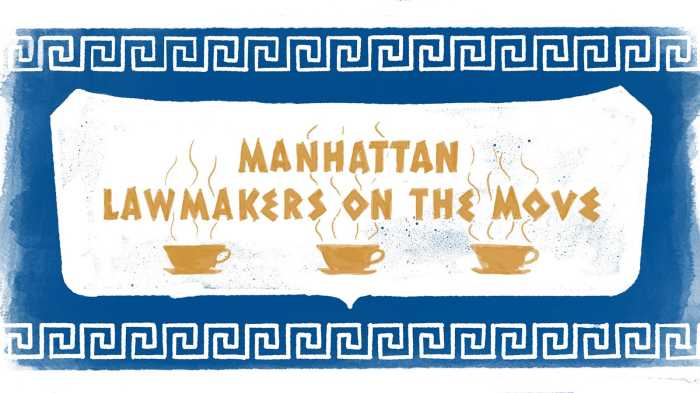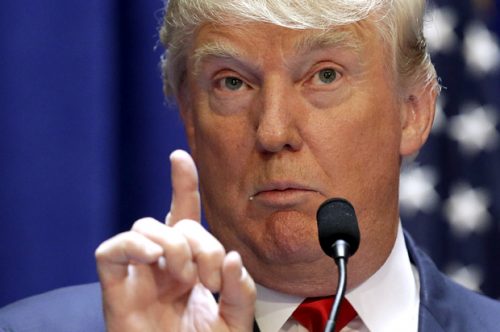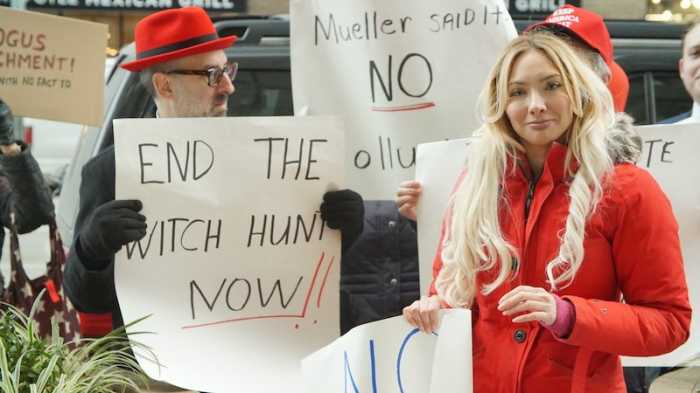The Downtown Independent Democrats (DID) aren’t about to let social distancing guidelines prevent them from convening – or from maintaining contact with New York lawmakers.
The DID Happy Hour is a monthly event where club members and electeds convene to socialize and discuss recent issues. At 6:30 p.m. last night, the club hosted their first ever virtual iteration of the event over Zoom. U.S. Rep. Jerrold Nadler (D-Manhattan, Queens) was a featured guest, and the night also saw appearances from Councilmember Carlina Rivera (D-East Village, Gramercy Park) and State Senator Brad Hoylman (D-Chelsea, Midtown).
“We know this is not a happy time,” said DID President Richard Corman. “There’s a lot of suffering; there are people dying; we know that. But we also think that it’s important for us to try to stay connected in ways that help us get through this.”
The club gave the floor to Rep. Nadler shortly after the session began. He began with an overview of the CARES Act, summarizing what the bill does – and doesn’t – provide for the nation. In Nadler’s words, the bill took “important emergency steps” for providing Americans with immediate relief. For instance, the act grants unemployed Americans an additional $600 in unemployment benefits. Furthermore, it expands unemployment eligibility to include freelancers and gig workers, who are unlikely to find work during the crisis.
This, said Nadler, was a provision that he fought particularly hard for.
“I fought hard to ensure that the bill covered freelance and contract workers,” said Nadler. “I’m glad we were able to expand traditional unemployment to these people. A large number of people in our district, obviously, are not in traditional jobs; they’re contract workers, they’re gig workers.”
Among the other provisions he mentioned were a moratorium on evictions for federally subsidized homes, $4 billion in funding for public housing organizations, and the suspension of student loan payments until the end of September.
However, he also pointed out several gaps in the bill’s coverage: gaps that he and his peers intend to fill with future legislation. As an example, he brought up the provision that grants onetime stimulus payments of $1,200 to all Americans, and $2,400 to married couples. Nadler said that the payments, while helpful, are insufficient, particularly to residents of New York, where the cost of living is high.
“While the bill provides remarkable measures to meet the challenge of this moment, I believe more must be done,” said Nadler. “And it was remarkable, especially since we had a Republican senate to deal with. But the bill does not provide nearly enough funding for New York, to cover the costs that the city and state are bearing. We have to make sure, going forward, that our state, which is on the frontline of the pandemic, remains whole.”
Nadler then took the time to answer questions from DID club members and other attendees. One member asked about the bill’s Paycheck Protection Program (PPP), a loan program to help small businesses keep their workers on payroll. The member claimed to know a business owner who tried to apply for a PPP loan from Wells Fargo, only to hear that the PPP loan fund had already been fully subscribed.
“I don’t know what other banks are experiencing, but this doesn’t bode well for the amount of money in that program,” he said.
Nadler agreed, and reiterated that future legislation will be necessary to fill that gap.
Another member asked about the prospect of expanding the Victims Compensation Fund (VCF) to include COVID-19 frontline workers. Nadler conceded that he hadn’t considered it, but thanked her for giving him the idea.
“I think that’s a very good idea,” said Nadler. “Expanding it to include victims of this virus is a very good idea. I certainly would support that, and I thank you for giving me the idea.”
Afterwards, Nadler gave the floor to Rivera and Hoylman, who discussed recent developments in the fight against the pandemic. Both of them expressed serious concerns about the 2020 New York State Budget, which passed late last week. The budget will slash New York’s Medicaid program significantly, due to an expected shortfall in tax revenue.
By Hoylman’s account, the cuts would have been even larger if he and his peers hadn’t fought them so diligently.
“This was definitely a tough state budget,” said Hoylman. “In our senate district alone, there were going to be $60 million worth of Medicaid cuts to hospital. We restored more than $300 million of those cuts, and passed some other important savings for hospitals. But it wasn’t a pretty sight.”
On the positive side, Hoylman was able to secure guaranteed sick leave of five to seven days for all employees, among other provisions.
Meanwhile, Rivera announced several upcoming proposals that she plans on putting forth in the future, to compensate for the cuts. One proposal would allocate $12 billion for small business relief in New York – which, ideally, the federal government would pay for. Another idea she shared was a proposal for a public bonds program, similar to the one issued post-9/11.
“Now, this is a very, very different economy compared to post-9/11, because it’s a global crisis,” said Rivera. “So we’re not sure if this is exactly going to work out. But it’s an idea for how we can put money back into our workers’ pockets, and also the pockets of our small business owners, who are really, really suffering.”
Rivera will be joining the DID again at their membership meeting on Wednesday, Apr. 22.


![U.S. Rep Jerrold Nadler [photo provided by Daniel Schwarz]](https://politicsny.com/wp-content/uploads/2021/02/0fdf7a71-ba8f-4ea3-a0fd-0fbd6268f443-e1586275822452.jpg?quality=51&w=1200)






